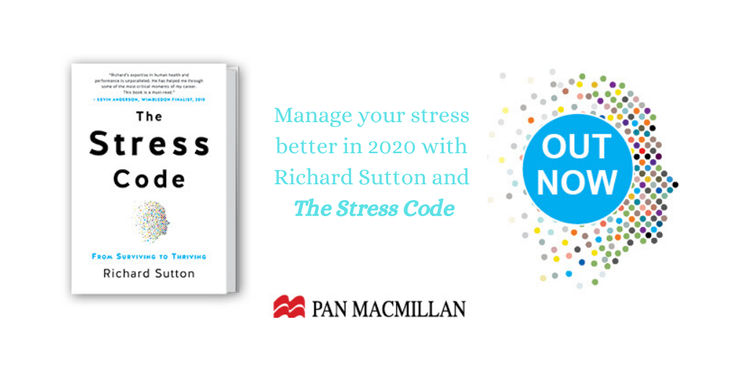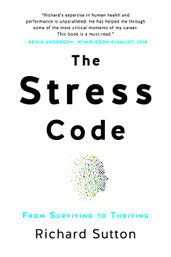Practical tips for managing stress and anxiety
In this extract, you’ll find practical ways to help manage pressure and how they are beneficial for mental and physical health. This piece is from The Stress Code: From Surviving to Thriving by Richard Sutton, a health and performance educator and consultant, who is considered one of the foremost experts in his field.

"Whenever we feel that things are chaotic and there is uncertainty, it puts our stress axis in overdrive and crashes our immune system. With the Coronavirus creating so much uncertainty, it is accompanied by unprecedented levels of stress - no one is exempt. What can we do to lessen the effects of uncertainty? According to researchers we need to reinforce control, authority and structure within our own lives."
Here's what you can do to lessen the effects of uncertainty:
Massage therapy
- Is an effective stress management/resilience tool. Not only does massage therapy increase vagus nerve activity and raise oxytocin, but it also significantly lowers cortisol. Moreover, massage promotes an increase in serotonin and dopamine, which positively influence cognition and behaviour.
Controlled breathing
- Controlled breathing exercises may be effective in managing high blood pressure and related health issues.
- Research shows controlled breathing exercises to be effective in managing depression and anxiety disorders.
- Deep diaphragmatic breathing can create improved engagement of numerous regions of the brain, including those responsible for memory and emotional processes.
Swimming activates
- The vagus nerve and reduces activity of the stress axis through a survival response called the ‘dive reflex’. Additional benefits are achieved through exercise and rhythmic breathing in the water.
- Regular swimming has been shown to dramatically reduce the risk of chronic diseases as well as improve life expectancy.
Cold water (10°C/50°F) or pack (1–2°C/34°–36°F)
- Facial immersion for a period of 30 seconds to 3 minutes triggers vagus nerve activity through its relationship with the trigeminal nerve. This nerve has been used as a reliable measure of vagus nerve functionality and provides a quick and easy solution to managing stressful situations.
Regular yoga practice is successful in managing chronic stress and promoting stress resilience.
Yoga is more than a simple exercise routine. It encompasses:
- physical postures and exercises
- breathing exercises
- deep relaxation techniques, and
- meditation and/or mindfulness practices.
- These activities promote physical strength and flexibility, enhance respiratory functioning, increase the ability to release tension, and improve cognitive and emotional integrity. Studies show that yoga is successful in improving behaviour and reducing stress in children. Studies have shown that yoga practice is effective in reducing the symptoms of depression and lowering cortisol in depressed patients. Daily yoga practice in healthy individuals can result in a 40% reduction in cortisol levels.
Meditation is a form of mental training that aims to improve an individual’s attention and emotional self-regulation.
Meditation has beneficial effects in a number of important cognitive domains, including attention, memory, verbal fluency, executive function, processing speed, overall cognitive flexibility and conflict monitoring, and can even enhance creativity.
- Can lower cortisol and reduce stress responses.
- Helps to dramatically improve connectivity and functionality within the brain.
- Meditation training enhances the structural properties of the brain in no less than eight specific regions and protects the brain against ageing.
- It positively affects our DNA in such a way that it reduces inflammation and improves immune regulation.
- Meditation practice in younger individuals increases brain size and volume.
- Each form of meditation brings with it its own unique benefits, which can be tailored to your needs.
Music is a powerful tool in promoting stress resilience.
- Listening to slow, calming music increases vagal tone and oxytocin levels.
- Relaxing music also lowers cortisol and increases dopamine, opioids, serotonin and beta-endorphins.
- Pleasurable music increases blood flow to areas of the brain responsible for:
- Listening to relaxing music prior to a stressful event increases alertness and arousal and enhances recovery after the event.
- Listening to nature sounds prior to a stressful event lowers cortisol and stress hormone responses.
Listening to calming music:
- can promote deep relaxation by altering brain wave states in favour of alpha, and possibly even theta, waves
- increases levels of Immunoglobulin A (IgA), a powerful antibody that provides increased protection against pathogens
- reduces inflammation, specifically the pro-inflammatory molecule known as IL-6
- before bed improves all aspects of sleep and is highly effective in managing insomnia.
- Listening to classical music reduces allergic reactions to food.
- Listening to Mozart has been shown to increase growth hormone levels.
- Listening to music during aerobic exercise increases performance and time to exhaustion.
Watch Richard Sutton sharing insights and interventions that will help you to thrive in the face of adversity:
The Stress Code is also available on eBook here: https://amzn.to/3ak1YnM
The Stress Code
by Richard Sutton
Stress impacts all facets of our lives and it is having devastating effects on the global economy. Effects such as reduced productivity and the huge burden being placed on healthcare systems around the world. Research has revealed that stress can destabilise our DNA, thereby compromising our genetic integrity, leading to the increase in many of the diseases we as a society are grappling with. Stress on an ongoing basis is one of the biggest challenges faced by the human race but in short bursts it can actually offer tremendous potential to grow, break personal barriers and excel.
This book is therefore one of resilience not avoidance. Full of tools and skills to buffer the adverse effects of stress and enhance functionality and health, The Stress Code is a response to the global call for stress management solutions. Supported by extensive scientific research, the book offers comprehensive and structured insights and interventions to assist in thriving in adversity.
